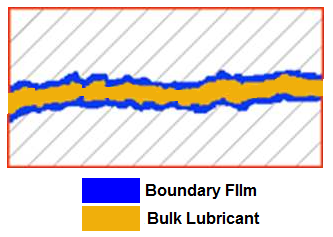|
|
||
mixed film lunrication.
In these cases, bearings are operating in the mixed film lubrication regime. Although lubricating fluid is present, conditions of operation do not permit complete surface separation and some asperity contact will occur. The wear rate is predicated upon the following:
A side effect of wear occurring in the mixed film lubrication regime is the formation of organic residues through interaction between the fluid and the wear process. It is believed that the exposure of highly reactive surfaces during the wear process along with the high temperatures at asperity contacts act to "polymerize" the fluid, forming a viscous sludge, which inhibits bearing rotation. The typical instrument ball bearing failure is characterized by the presence of such sludge. Also see: Boundary Lubrication and Film Lubrication.REAL Services 700 Portage Trail Cuyahoga Falls, OH 44221.3057 voice: 330.630.3700 fax: 330.630.3733 © 1995-2005 REAL Services® U.S.A. - Analytical Almanac All Rights Reserved |
||
